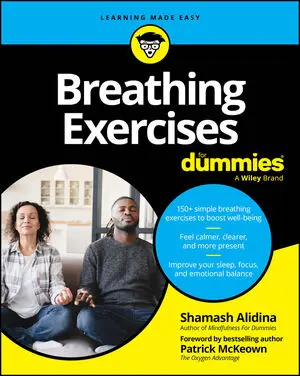Your breath is like your body's built-in Swiss Army knife—simple, always available, yet incredibly powerful. Most of us take around 20,000 breaths per day without giving it a second thought, but what if those breaths could do so much more than just keep you alive?
Breathing exercises aren't just trendy wellness practices; they're scientifically-backed tools that can transform multiple aspects of your health and happiness. From reducing stress hormones to boosting your immune system, conscious breathing offers benefits that reach into every corner of your well-being. Ready to discover how something as simple as changing the way you breathe can change your life? Let's dive into ten incredible ways breathing exercises benefits can enhance your daily experience.
1. Reduce stress like hitting a reset button
Ever notice how your breathing changes when you're stressed? Those quick, shallow chest breaths aren't doing you any favors. That's your ancient stress response kicking in, preparing you to outrun a predator—even though you're probably just dealing with a difficult email.
Controlled breathing activates your parasympathetic nervous system, your body's "rest-and-digest" mode. This simple shift lowers stress hormones like cortisol faster than you might expect. Deep diaphragmatic breathing literally tells your nervous system to chill out.
Research supports this connection too. A corporate executive who couldn't sleep due to chronic stress learned the 4-7-8 breathing technique (inhale for 4 counts, hold for 7, exhale for 8). Within two weeks, his stress levels dropped so dramatically that his team asked if he'd been on vacation! Just five minutes of focused breathing can create a sense of peace that lasts for hours.
2. Sharpen your focus and concentration
Is your attention span shorter than a goldfish's? You're not alone in this age of constant notifications. Your breath can help strengthen those scattered focus muscles.
All breathing exercises train you to focus on one thing: your breath. This strengthens the brain regions responsible for attention and concentration. Studies at Trinity College Dublin found that controlled breathing changes your brain chemistry by influencing noradrenaline levels—a natural brain messenger that enhances attention when produced in optimal amounts.
Think of your attention as a muscle that breathing exercises help strengthen. Each time you bring your awareness back to your breath, you're doing a mental push-up. One university professor complained she couldn't grade papers for more than a few minutes without getting distracted. After three weeks of daily breathing practice, she could maintain focus for over an hour at a stretch.
3. Boost your energy levels naturally
Feeling sluggish? Before reaching for that third cup of coffee, try energizing yourself with your breath instead. Many people breathe inefficiently, using only a small portion of their lung capacity, which means less oxygen for your cells and less energy for you.
Proper breathing techniques can significantly increase oxygen delivery, giving your cells the fuel they need to generate energy. It's like having your own built-in power source that quietly tops up your personal energy bank account.
Try this: Whenever you're low on energy, use that as a cue to do at least three breath cycles of slow, deep breathing into your abdomen. This technique, called light, slow, deep (LSD) breathing, can provide a calm and sustainable energy boost without the jitters or crash that comes with caffeine.
4. Enhance your physical performance
Whether you're training for your first 5K or gearing up for a marathon, your breath is your body's hidden performance enhancer. During exercise, your muscles demand up to 15 times more oxygen than at rest. But it's not just about breathing more—it's about breathing better.
Shallow, rapid breathing actually limits oxygen delivery to your muscles by reducing carbon dioxide levels and causing blood vessels to constrict. This ironically makes you feel more breathless and tired. Slow, rhythmic nasal breathing trains your body to use oxygen more efficiently, boosting endurance and reducing recovery time.
Think of your breath as your built-in pacer. Set the rhythm right, and you won't just go further—you'll do it with less effort. When your breath works for you instead of against you, you'll feel the difference in every stride, stroke, or movement.
5. Improve your sleep quality dramatically
If counting sheep isn't working, try counting breaths instead. Sleep issues often stem from an overactive nervous system that keeps your body in "alert mode" when it should be winding down.
Slow-paced breathing techniques have been scientifically proven to improve sleep quality and enhance heart rate variability during sleep—a key indicator of restorative rest. The secret? Exhaling for longer than you inhale signals your nervous system that it's safe to relax.
One participant with chronic insomnia practiced 15 minutes of extended exhale breathing before bed. Within two weeks, she reported falling asleep within minutes rather than hours and waking refreshed for the first time in years. Just 15 minutes of slow breathing before bedtime can transform your sleep quality—it's like a lullaby for your nervous system.
6. Cultivate mindfulness and present-moment awareness
In our hyper-distracted world, the ability to be fully present is becoming a superpower. Your breath is the simplest gateway to mindfulness because it's always happening now—you can't breathe in the past or future.
Each time you focus on your breath, you're automatically practicing mindfulness. Your breath serves as a mindfulness magnet, constantly pulling your awareness back from scattered thoughts about worry and planning into the richness of the present moment.
The key is approaching this practice with kindness. When your mind wanders (and it will), simply bring your attention back to your breath with as much gentleness as you can muster. This friendly approach helps build a sustainable mindfulness practice that actually feels enjoyable rather than forced.
7. Build emotional resilience and fitness
Your breath doesn't just help you feel better momentarily—it builds your capacity to handle whatever life throws at you. Most people suppress difficult emotions, creating a pressure cooker of unexpressed feelings. Breathing exercises provide a safe way to process these emotions.
Through specific breathing patterns, you can release stored tension and increase your window of tolerance for challenging feelings. Regular breathing practice is like emotional weight training—you're building the strength to carry life's inevitable heavy loads with greater ease.
A healthcare professional discovered she'd been holding grief in her body for months during the pandemic. Through guided breathing exercises, she was able to process these emotions safely. "It was like finally opening windows in a stuffy room," she shared. The breath didn't eliminate her challenges but gave her the resilience to face them without becoming overwhelmed.
8. Strengthen your immune system
Want to boost your body's defense system? The answer might be right under your nose. Conscious breathing positively impacts immune function through several mechanisms: reducing inflammation, improving lymphatic flow, and balancing your autonomic nervous system.
Your autonomic nervous system runs quietly in the background, managing essential functions including immune response. It has two main branches: the sympathetic system (fight-or-flight) and parasympathetic system (rest-and-digest). When you spend more time in the calm, parasympathetic state through conscious breathing, your body can shift energy toward healing and immune system maintenance.
Think of each conscious breath as a tune-up for your immune system—simple maintenance that keeps your internal protection squad working at peak performance. One workshop participant practiced regular breathing exercises throughout cold and flu season and remained healthy while colleagues around her were getting sick.
9. Enhance your relationships
Here's something unexpected: better breathing leads to better relationships! When you're triggered in a relationship, your breathing pattern changes, often accelerating into fight-or-flight mode. This physiological shift impairs your prefrontal cortex—the brain region responsible for empathy, rational thinking, and communication.
Conscious breathing switches your wise mind back on, giving you the mental clarity to respond thoughtfully rather than react impulsively. It creates space between stimulus and response, where better choices are made.
During heated discussions, taking even three slow, deep breaths can completely shift your ability to listen with genuine curiosity instead of formulating defensive responses. This simple practice can transform conflicts into opportunities for deeper understanding and connection.
10. Support your long-term health and longevity
Breathing properly may actually help you live longer! Research shows a correlation between breathing patterns and longevity. Compare human breathing rates with those of tortoises, who take only about four breaths per minute and live significantly longer than humans.
Slower, more efficient breathing patterns are associated with decreased mortality risk. The breathing exercises enhance stress resilience by balancing your sympathetic and parasympathetic nervous systems—a balance crucial for long-term health maintenance.
Think of breathing well as making small, consistent deposits in your health savings account. The returns may not be dramatic day to day, but over time, the compound interest is remarkable—potentially adding not just years to your life but life to your years. You'll take roughly half a billion breaths in your lifetime, so making even a small percentage of them more conscious can translate to significant health benefits.
Ready to harness the power of your breath? Start with just three conscious breaths right now. Notice how this simple act can shift your entire state of being. Whether you're looking to reduce stress, boost energy, or simply feel more present in your daily life, your breath is always there, ready to support your journey toward greater well-being.






